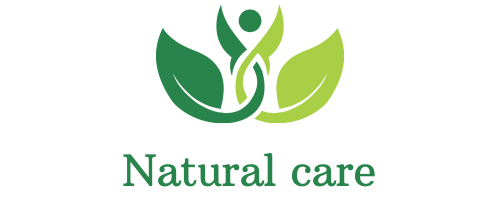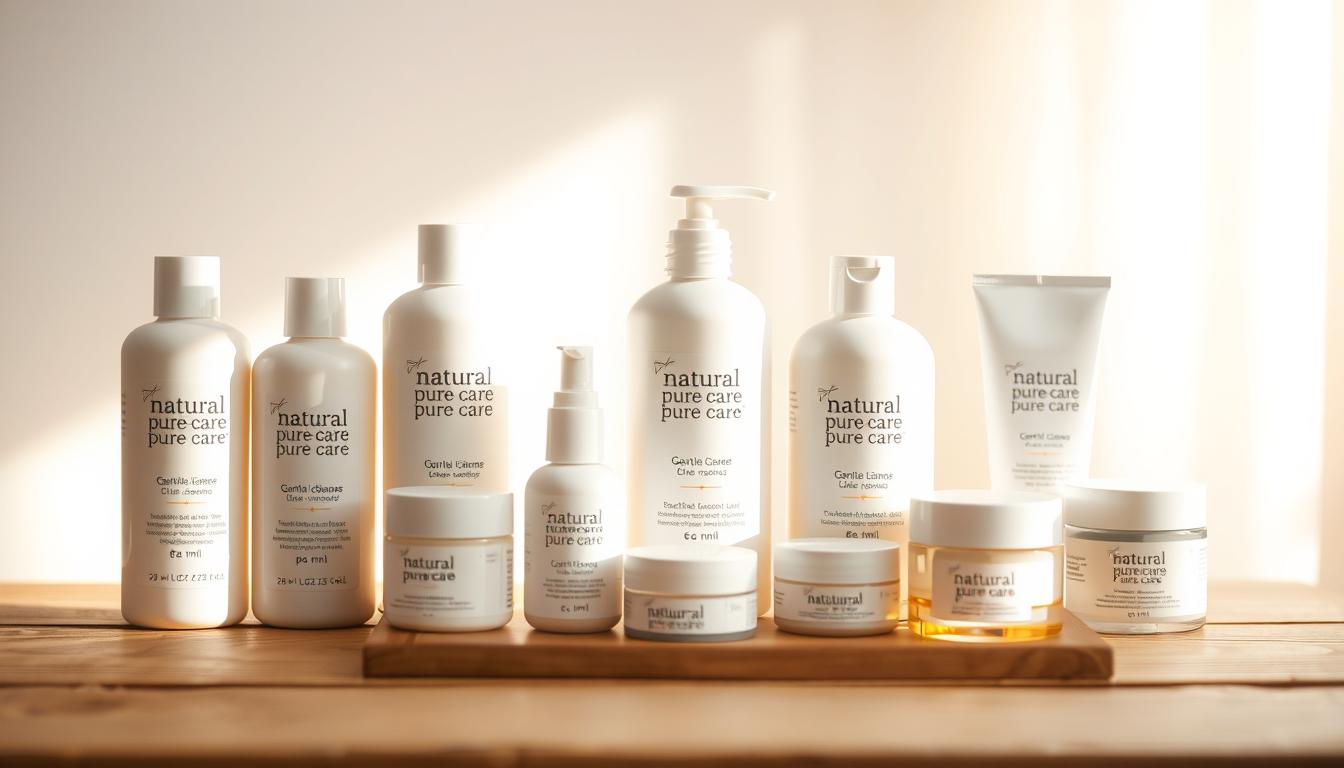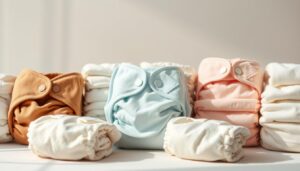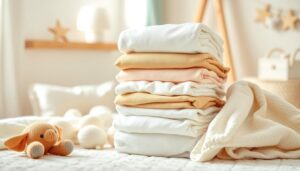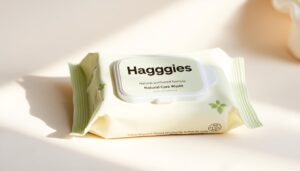Gentle & Safe: Top Non-Toxic Baby Skincare Products for Your Little One’s Delicate Skin
Every year, over 300,000 U.S. households choose non-toxic baby skincare to avoid harmful chemicals. Yet, 1 in 5 parents still use products with synthetic fragrances that can irritate skin. Your baby’s skin is much thinner than yours, making it more sensitive to what it absorbs.
Traditional baby products often have parabens and phthalates. But, 80% of pediatricians now suggest using hypoallergenic, EWG-verified products instead. Brands like Earth Mama and The Honest Company use natural ingredients like olive oil and shea butter. This shows that natural ingredients can be just as effective without the risks.
Prices for safe baby skincare range from $4 to $44. Choosing safe products is not just a trend—it’s essential for your baby’s health.
Baby skin has a higher pH level than adult skin, making it more prone to chemical irritation. Over 60% of parents see fewer rashes when using products like Babo Botanicals or Weleda. These products avoid synthetic additives.
Pediatricians say even small amounts of unneeded ingredients can harm your baby’s developing skin barrier. This barrier takes up to two years to fully mature. This guide helps you choose gentle cleansers, moisturizers, and solutions for cradle cap. It’s based on science and real-world parent reviews.
Table of Contents
Why Your Baby’s Skin Needs Special Care
Newborn skin needs protection right away. A baby’s skin barrier is still growing and takes up to a year to fully develop. This is why gentle baby skincare is so important during this time.
Understanding Your Baby’s Skin Barrier Development
A baby’s skin is much thinner than an adult’s, holding less moisture. The outer layer of the skin, called the stratum corneum, gets stronger over time. This makes babies more likely to get irritated by harsh products or dry air.
Pediatricians say to use products without fragrances. This helps keep the baby’s skin barrier safe and healthy.
Key Differences Between Baby and Adult Skin
- Thickness: 20-30% thinner, offering less protection
- pH Balance: More acidic pH 5.5-6.5 requiring pH-balanced cleansers
- Oil Production: Reduced sebum means faster moisture loss requiring frequent hydration
Common Skin Challenges for Newborns
Diaper rash, eczema, and cradle cap are common issues. Eczema, affecting 1 in 5 babies, can be hereditary. Baby skincare for sensitive skin should avoid harsh chemicals like synthetic fragrances.
Cradle cap looks like scaly patches on the scalp. Diaper rash happens when the diaper stays wet too long. Experts say to bathe babies gently, not too often, to prevent dryness.
Moisturizing right after a bath helps keep the skin hydrated. Ingredients like aloe vera and calendula are good for soothing. Always test new products and talk to a pediatrician if you have concerns.
The Hidden Dangers in Conventional Baby Skincare
Many baby products called “gentle” or “natural” still have hidden risks. Chemicals like parabens and phthalates in lotions or shampoos can harm your child’s health. It’s important to know these dangers to pick safe baby skincare.
Harmful Ingredients to Avoid
Avoid products with:
- Parabens: Mimic hormones, disrupting development.
- Phthalates: Linked to learning disabilities and reproductive issues. A study of 630 children found higher phthalate levels in those using hair oils or lotions.
- Sulfates: Strip skin barriers, causing dryness and irritation.
- Formaldehyde releasers: Classified as carcinogens by the IARC.
Long-term Health Concerns of Chemical Exposure
| Chemical | Risk | Safe Alternative |
|---|---|---|
| Parabens | Endocrine disruption | Plant-based preservatives |
| Phthalates | Neurological damage | Essential oils |
| 1,4-dioxane | Linked to cancer | Certified organic extracts |
Research shows 88–100% of tested products contain these chemicals. California’s Toxic-Free Cosmetics Act now bans 24 toxic ingredients. Still, 65% of brands skip safety tests before launch.
Reading and Understanding Product Labels
Look beyond buzzwords like “natural.” Here’s how to spot red flags:
- Check the full ingredient list—not just marketing claims.
- Avoid products with fragrance or parfum (often hiding phthalates).
- Choose brands with transparent ingredient lists, like those certified by the EWG or Leaping Bunny.
Over 78% of parents want chemical-free baby skincare, but 30% of products still use untested ingredients. Always verify certifications and prioritize brands that avoid synthetic additives.
What Makes Non-Toxic Baby Skincare Products Different
Non-toxic baby skincare products focus on what your baby’s skin needs. They don’t use harsh chemicals that can irritate or harm in the long run. Instead, they use natural ingredients like aloe vera and shea butter to moisturize without being too heavy.
Certifications are important. Look for USDA Organic or EWG Verified labels when picking the best non-toxic baby products. Brands like California Baby and Evereden, supported by Harvard and Stanford dermatologists, are safe choices. They use hypoallergenic formulas, like Lav Kids’ Foaming Cleanser, to reduce skin reactions.
Consumer Reports and Made Safe found that organic ingredients like olive oil and shea butter outperform lotions with petrolatum or silicones in safety tests.
These products help protect your baby’s skin barrier. YAWN’s routines, for example, use recycled packaging and avoid sulfates, showing eco-friendly commitment. Brands like Bare Young, a Black-owned company, offer cruelty-free formulas without parabens or fragrances. Even though they cost more, they ensure quality and safety.
Choosing non-toxic options means picking ingredients that promote skin health. The best non-toxic baby products are safe and effective, supported by science and certifications. This helps you make smart choices for your baby’s sensitive skin.
Essential Ingredients to Look for in Natural Baby Skincare
Choosing the right ingredients is key when picking natural baby skincare products. Look for brands that use plant-based ingredients to protect your baby’s sensitive skin. Here’s what to look for in every product.
Plant-Based Oils and Butters
- Shea Butter: Moisturizes without clogging pores, found in Weleda’s Calendula Baby Creme ($14.50).
- Coconut Oil: Naturally antimicrobial, ideal for daily massage to boost circulation.
- Jojoba Oil: Mimics skin’s natural oils, gentle for eczema-prone skin in products like Earth Mama Organics’ Diaper Balm.
Botanical Extracts for Soothing
Aloe vera and chamomile reduce redness. California Baby’s Super Sensitive Shampoo ($14.99) uses oat extract to calm irritation. Organic baby skincare brands like Baby Mantra add calendula, which research shows accelerates healing for rashes.
Safe Preservatives
- Vitamin E: Acts as an antioxidant in Burt’s Bees Baby Creams ($17.98).
- Rosemary Extract: Natural antimicrobial in Mama Earth products.
- Essential Oils: When used in small amounts, like lavender in The Honest Company’s wipes.
Certifications like EWG Verified (Baby Mantra) or USDA Organic (Earth Mama) ensure no synthetic additives. These ingredients work together to build a barrier against dryness while avoiding toxic absorption risks. Always check labels for 100% plant-based formulas and pediatrician approvals.
Top-Rated Organic Baby Lotions and Moisturizers
Choosing the right organic baby skincare is crucial for your baby’s skin. Look for products with natural oils like shea butter and sesame oil. These oils keep the skin moist without using harsh chemicals. Here are some top picks that are safe, effective, and affordable:
- Earth Mama Calming Lavender Baby Lotion ($15) – This lotion is certified organic by NSF/ANSI 305. It uses lavender oil to soothe and soften the skin. It’s great for babies with eczema.
- Puracy Baby Lotion ($10) – This lotion is vegan and cruelty-free. It absorbs quickly and is free from harmful chemicals. Parents love its lightweight feel and eco-friendly packaging.
- Pipette Calendula Baby Lotion ($12) – This lotion uses science-backed ingredients like calendula extract and chamomile oil. It’s hypoallergenic and tested by pediatricians.
- The Honest Company Lotion ($8–$10) – This lotion is made with 98% natural ingredients. It’s fragrance-free, making it perfect for sensitive skin. It’s widely available in stores.
“The Puracy lotion absorbed instantly without leaving residue—our pediatrician recommended it for my premature baby.” – Parent Review
Always do a patch test before using a new lotion. Look for USDA Organic or NSF certifications to ensure it’s pure. Brands like Burt’s Bees offer quick-absorbing formulas. Eucerin Eczema Cream targets dry patches with ceramides technology.
Avoid lotions with strong fragrances. Some products, like Cetaphil and Johnson’s, can cause burning. For budget-friendly options, try multi-purpose lotions like Tubby Todd ($9). It works for the whole family. Eco-conscious parents prefer Butter Me Up Organics for its 100% recyclable packaging.
Remember, gentle baby skincare means no synthetic dyes or phthalates. Always check certifications and read real parent reviews to find the best lotion for your baby.
Best Non-Toxic Baby Cleansers and Shampoos
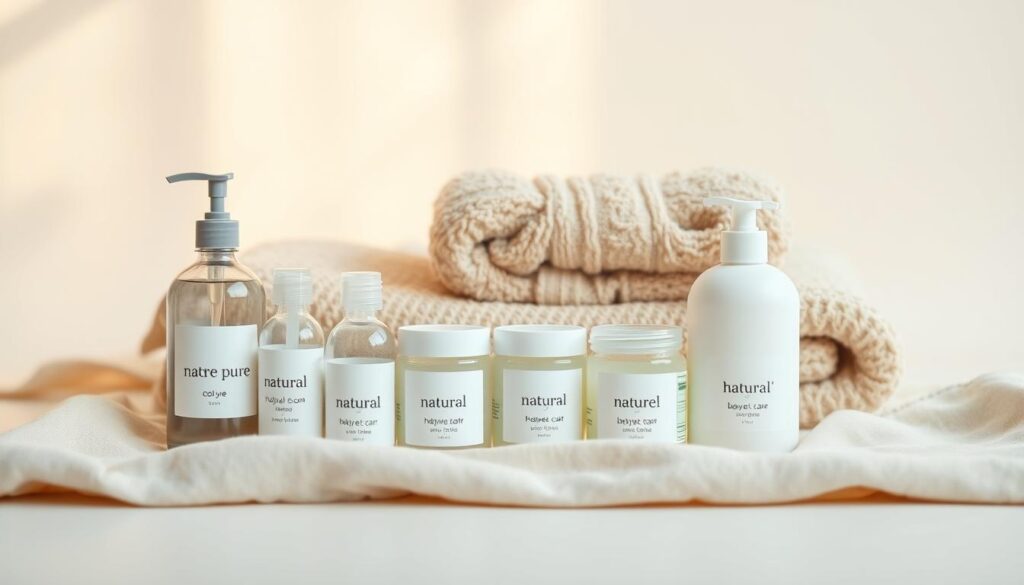
Choosing the right cleansers and shampoos is key for your baby’s skin. Look for tear-free and pH-balanced formulas. These protect their skin barrier and avoid harsh chemicals. Make sure they don’t have sulfates, synthetic fragrances, or dyes.
“Babies’ skin is 15% thinner and absorbs substances faster, making non-toxic baby skincare products a must for every family.” – EWG
Gentle Options for Everyday Use
Begin with tear-free formulas like Weleda Calendula Baby Shampoo & Wash. It uses organic calendula and white mallow for gentle cleansing. Burt’s Bees Baby and California Baby also offer gentle washes. They use natural ingredients and avoid harsh chemicals.
Specialized Products for Cradle Cap
Cradle cap needs gentle care. California Baby Scalp Oil uses almond oil and jojoba to gently remove flakes. EllaOla Baby Shampoo is EWG-verified and includes magnesium to soothe. Use a soft brush for 1-2 minutes before rinsing.
Multi-Purpose Bath Products Worth Trying
- Attitude Baby Leaves is a shampoo, bodywash, and bubble bath in one. It’s 98% naturally derived.
- HealthyBaby Foaming Shampoo creates lots of lather with just one pump. It lasts up to 250 baths when diluted.
- Kokoso Unscented Wash is made with coconut oil and no essential oils. It’s great for eczema-prone skin.
Look for USDA Organic or EWG Verified certifications for safety. Always test new products and rinse well in hard water. Choose brands that list all ingredients clearly to keep your baby safe.
Special Solutions for Babies with Sensitive Skin or Eczema
Dealing with sensitive skin or eczema means making smart choices. Look for baby skincare for sensitive skin that doesn’t irritate. California Baby’s USDA-certified line is fragrance-free, perfect for sensitive skin. Their diaper ointment and eczema creams are free from synthetic additives, making them a top pick.
“Thick, fragrance-free moisturizers are key to locking in moisture for eczema-prone skin,” says pediatric dermatologist Julie McClave, MD, FAAP.
Fragrance-Free Options That Really Work
Choose best non-toxic baby products with few ingredients. Stelatopia+ Biome Barrier Cream and Mustela Stelatopia Intense Cream use lipids to repair skin barriers. Tubby Todd Ointment is a thick, steroid-free option for severe dryness. Always check for USDA or National Eczema Association seals.
Doctor-Recommended Brands for Problem Skin
Top brands backed by pediatricians include:
| Product | Key Features | Price |
|---|---|---|
| Eucerin Baby Eczema Relief | 24-hour hydration, fragrance-free | $10 |
| Mustela Stelatopia | Clinically tested, lanolin-based | $15 |
| Roe Wellness Biome Barrier Cream | Plant-based, pediatrician approved | $23 |
Warning Signs That Require Medical Attention
- Rash with fever or pus-filled blisters
- Redness spreading beyond diaper area
- Scratching leading to skin breaks
- No improvement after 3 days of home care
If symptoms don’t get better, see a pediatrician right away. Severe cases might need prescription treatments.
Eco-Friendly Baby Skincare: Better for Your Baby and the Planet
Choosing eco-friendly baby skincare and chemical-free baby skincare options is good for your baby and the planet. Brands like Babo Botanicals use recyclable packaging and avoid synthetic additives. California Baby makes products in solar-powered facilities to reduce carbon footprint.
These actions help cut down plastic waste and harmful chemical runoff into water systems. Smart choices start with ingredients. Look for certifications like GOTS for organic cotton and EWG Verified™ for toxin-free formulas.
Brands like Caboo use bamboo and sugarcane for biodegradable wipes. OsoCozy’s flannel wipes are durable for years. Even small swaps, like switching to glass baby bottles or reusable food pouches from Weesprout, reduce plastic pollution.
- Biodegradable packaging replaces single-use plastics.
- Organic cotton avoids pesticides that harm soil and waterways.
- Recyclable materials lower landfill waste.
| Brand | Product | Eco Features |
|---|---|---|
| Kudos | Diapers | Cotton Natural™ seal, compostable outer layers |
| Caboo | Wipes | Bamboo/sugarcane, plastic-free |
| Nestig | Crib | Convertible design, FSC-certified wood |
| Avocado | Crib Mattress | Organic wool and GOLS-certified latex |
Small changes add up. Switching to chemical-free baby skincare reduces microplastic exposure. Sustainable brands like Force of Nature offer plant-based cleaners.
Start with one product at a time. Replace disposable wipes with cloth alternatives to ease into a greener routine.
Conclusion: Creating a Safe Skincare Routine for Your Little One
Baby skin is very delicate and needs careful attention. Their skin is five times thinner than adults, so every product matters. Choose the safest baby skincare products without harsh chemicals.
Use gentle, fragrance-free cleansers and moisturizers to keep their skin soft. Bathing 2–3 times a week in warm water helps keep natural oils. Daily moisturizing is key for their cheeks, hands, and feet.
For diaper rash or eczema, organic lotions are a good choice. Always test new products on a small area first. For sunscreen, use SPF 15+ after six months, as the AAP suggests.
Start by replacing just a few products at a time. Focus on areas that get wet or rubbed a lot. Even small changes, like using non-toxic products, help a lot. Watch how your baby’s skin reacts and adjust as needed.
Creating a safe skincare routine isn’t about being perfect. It’s about making smart choices that protect your baby’s skin. By choosing the best non-toxic products, you help their skin grow strong. This approach combines science and your parenting instincts.https://www.naturalpurecare.com/haggies-natural-care-wipes/
FAQ
What is non-toxic baby skincare, and why is it important?
How can I tell if a baby skincare product is safe?
Are all natural baby skincare products safe?
What are some common skin concerns for babies?
Can I use adult skincare products on my baby?
What ingredients should I avoid in baby skincare products?
How do I read product labels when shopping for baby skincare?
What are the benefits of using organic baby skincare products?
How can I establish a skincare routine for my baby?
Why is eco-friendly baby skincare important?
Source Links
- https://www.thegoodtrade.com/features/natural-baby-care-products/
- https://naturekidsco.com/blogs/learn/best-non-toxic-baby-lotions-safe-natural-options?srsltid=AfmBOorMXU1WoWOhAn1byKIoiv4IYK0fVsLYHmh4w2OlFzqEN6IO1dpA
- https://www.babygearlab.com/topics/bath-skincare/best-baby-shampoo
- https://www.omegapediatrics.com/baby-skincare-101/
- https://www.sparshhospital.com/blog/skincare-for-newborns-baby-soft-skin-needs-nurturing-too/
- https://www.npr.org/sections/shots-health-news/2024/09/09/nx-s1-5099419/hair-and-skin-care-products-expose-kids-to-hormone-disrupting-chemicals-study-finds
- https://pmc.ncbi.nlm.nih.gov/articles/PMC11381309/
- https://www.greenmatters.com/health-and-wellness/skincare-safe-for-kids
- https://www.consumerreports.org/babies-kids/baby-lotions/how-to-choose-a-baby-lotion-without-harmful-chemicals-a1485818651/
- https://orbasics.com/blogs/stories/organic-natural-baby-care-products?srsltid=AfmBOooYx8Z9OnGkwAf5jN3Dx1IPNiqTpQ2DAhj4yKzDSGZFEUQxyjfr
- https://elearning.wellcure.com/blog/natural-skin-care-for-babies-and-older-children
- https://www.babygearlab.com/topics/bath-skincare/best-baby-lotion
- https://www.babyforest.in/blogs/thoughts-and-ideas/benefits-of-using-organic-baby-lotion?srsltid=AfmBOorhdELbqHDxQ9V-k1SKVvf0i9kfp-hBc-3iN62jvsRwjD5zd_oY
- https://www.sustainablejungle.com/natural-organic-baby-skin-care-products/
- https://blog.dearsundays.com/non-toxic-baby-skincare
- https://www.greenwashingindex.com/natural-baby-bath-products/
- https://newmodernmom.com/blog/non-toxic-baby-shampoo/
- https://www.whattoexpect.com/baby-products/health-safety/best-eczema-cream-babies/
- https://www.noodleandboo.com/blogs/journal/the-ultimate-baby-skin-care-guide-from-newborn-to-toddler?srsltid=AfmBOoqH-Q5RZ4FmjDZWyy9iF8-WinkiOPryD5StzdNOB3IyEKTSP1sY
- https://milaskeeper.com/blogs/news/eco-friendly-baby-products-for-health-sustainability?srsltid=AfmBOopQKnn8y8uqsZPPhxph-O-vYFdTEPWduq7M6IiQpclquOKGPQX3
- https://naturekidsco.com/blogs/learn/best-non-toxic-baby-lotions-safe-natural-options?srsltid=AfmBOorvNIBxUeEEMEkXEkMGjwtSwAShgtSw3C1DWw4NEe4MpKVCWPZo
- https://www.mother.ly/baby/baby-products/eco-friendly-baby-care-items/
- https://natralus.com.au/blogs/news/the-ultimate-guide-to-baby-skincare-essential-tips-for-new-parents?srsltid=AfmBOoqA73JcOMcOdpbT8UvyuEBr8k1ul-almEI31Z3QhwX0D8csHTop
- https://www.healthline.com/health/baby/tips-for-protecting-baby-skin
